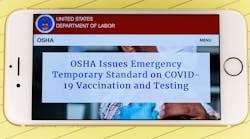Due to the Coronavirus pandemic, the Department of Transportation (DOT) has issued notices announcing the relaxing of some of its compliance standards that are part of federal hazardous materials packaging regulations.
Published on April 20 by DOT’s Pipeline and Hazardous Materials Safety Administration (PHMSA), the notices will remain in effect for the following 90 days, or while the Department of Health and Human Services (HHS) determination issued on Jan. 31 that a public health emergency exists remains in effect, whichever is soo
In the first Notice, PHMSA states that it is providing temporary relief from enforcement action if packaging manufacturers are unable to conduct periodic design qualification retesting because of COVID-19 operational disruptions.
Ordinarily, manufacturers of UN performance-oriented packaging must complete periodic retesting every 12 to 24 months to recertify the design type for production. PHMSA has indicated that packaging manufacturers are expected to comply with the hazardous materials regulations (HMR) “to the maximum extent practicable.”
The agency said it will not take enforcement action against a company that continues to manufacture such packaging beyond the mandated retest date if the manufacturer can document reasons why compliance is not possible. The packaging manufacturer also must maintain copy of documentation, including the most recent test reports.
PHMSA added that this only applies to designs tested and certified for PG II and PG III hazardous materials. In addition to not covering PG I packaging, the relief does not cover remanufactured and reconditioned design types. Also, production tests required under the DOT HMR (for example, leakproofness testing) must still be met during the manufacturing process.
In the second Notice, PHMSA states it is providing temporary relief from certain hazardous materials regulations requirements for persons transporting sanitizing and disinfecting materials on a motor vehicle only for the purposes of protecting the health and safety of employees directly supporting the logistical operations of the carrier.
The intent is to extend the relief afforded under the materials of trade (MOT) exception to certain carriers whose activities would not ordinarily meet one of the three principle qualifying criteria specified in the definition of MOT, explain attorneys Trent M. Doyle and Taylor D. Johnson of the law firm of Keller and Heckman LLP. A material of trade is not subject to any other requirements of the DOT HMR besides those prescribed in the regulations that pertain to eligible materials, packaging, hazard communication and quantity.
PHMSA indicated it will not take enforcement action against any carrier transporting sanitizing and disinfecting materials on a motor vehicle for the purpose of protecting the health and safety of employees of the carrier if:
● The sanitizing and disinfecting materials are intended to allow employees to adhere to CDC guidelines for protecting against COVID-19.
● The materials are being provided to protect the health and safety of employees who directly support the operations of the carrier (for example sorting, loading/unloading, driving delivery vehicles).
● The materials are transported by motor vehicle.
● The shipment complies with the MOT provisions regarding hazard class, quantity, packaging, hazard communication, and aggregate grow weight.
● The materials can only be utilized by the carrier’s employees (that is, not for retail sale).
On March 27, PHMSA also reported that for the following 90 days it would not be taking enforcement action against any offeror or carrier of hazardous materials for failure to comply with the recurrent DOT hazmat training requirements.
The enforcement discretion is intended to minimize disruptions in the supply-chain and is being allowed for the Federal Aviation Administration, Federal Motor Carrier Safety Administration, Federal Railroad Administration and the U.S. Coast Guard as well.
However, keep in mind that this enforcement discretion does not cover noncompliance with the initial DOT hazmat training obligation. This means that employers are not being provided leeway to assign employees to perform hazmat employee duties who have not previously satisfied the initial DOT hazmat training requirements, note the Keller and Heckman attorneys.




